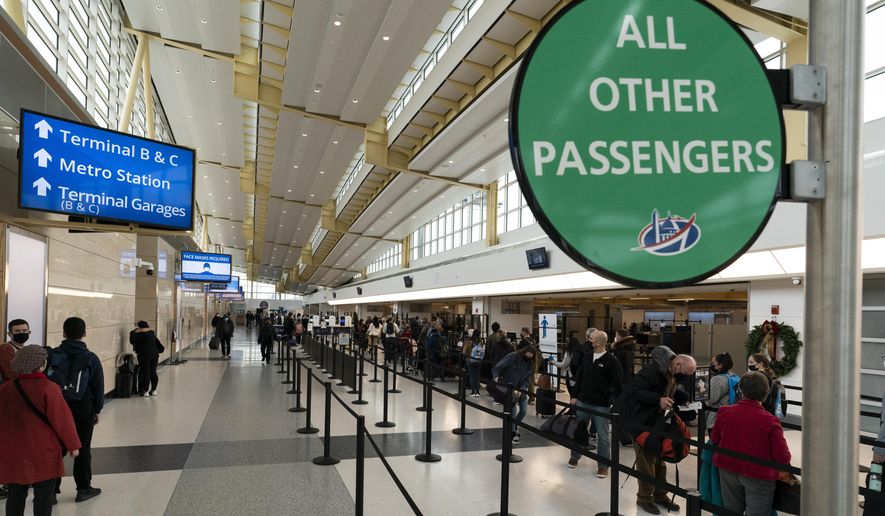A version of this story appeared in the daily Threat Status newsletter from The Washington Times. Click here to receive Threat Status delivered directly to your inbox each weekday.
The Transportation Security Administration is looking to upgrade its use of emerging technology to screen people at airports, testing sophisticated facial recognition tools and working with Big Tech companies on “digital IDs” to identify passengers.
The TSA said Friday that officials recently visited Apple and Google in California to discuss an ongoing collaboration for digital IDs accessible on phones, designed to replace physical identification cards at airport security checkpoints.
“The administrator engaged with Google and Apple executives to address states adopting the use of state-issued digital IDs and their acceptance at the security checkpoint during the identity verification process,” the TSA said in a statement. “TSA is working with the tech giants so passengers can identify themselves with IDs stored on their phones at airports.”
Google said its work with TSA revolves around its Google Wallet project. The company pointed The Washington Times to a 2023 blog post explaining that the Big Tech company was working on making it possible to save a government ID to the Google Wallet, which could then be used in TSA PreCheck lines at select airports.
The company declined to answer questions about its meeting with TSA and Apple did not respond to requests for comment.
Google national security policy official Connie LaRossa posted about the meeting with the TSA on LinkedIn, saying her team was looking forward to being part of the TSA’s vision for the future of travel.
TSA Chief Innovation Officer Steven Parker said on LinkedIn that the meetings with Apple and Google provided government officials with details on the status of the digital IDs’ acceptability at airports in “approximately 20 states.”
A list of participating airports is visible on the TSA’s website, on a page documenting the agency’s use of “facial recognition and digital identity solutions.” The TSA’s website said passengers must still carry physical identification and present it to federal officials if asked.
TSA is testing facial recognition tools, too, and the Biden administration’s new AI rules for federal agencies include provisions designed to let people opt out of the TSA’s experiments.
A White House fact sheet published last month said the government’s new requirements meant airport travelers would be able to decline to participate in the TSA’s facial recognition tech without losing their place in line.
The TSA argues that people have already had this option and the White House later changed its fact sheet to say that travelers will “continue to” have the option of opting out without any delay.
Travelers confronted by the new facial technology at Ronald Reagan Washington National Airport have not always been able to opt out without losing their spot in line.
Sen. Jeff Merkley, Oregon Democrat, attempted to opt out of the facial recognition tech at the airport in Virginia last year and was pressured by a TSA officer who told the senator to step aside while others were allowed to bypass him. The senator published a video showing the TSA officer’s actions on his website.
For people who do submit to the TSA’s facial recognition experiments, the Department of Homeland Security is holding their personal information.
“During the evaluation periods, your photo and limited biographic information will be shared with DHS Science and Technology Directorate to evaluate the technology’s effectiveness,” the fine print of the TSA’s website acknowledges, alongside details of how to decline the government’s tech tests.
The facial recognition tests on airport travelers are likely not the last experiments that transportation security agency will conduct. Alongside its meetings with Apple and Google, TSA officials said they also met with Department of Defense officials and an intelligence community-backed investment fund which are both financing emerging tech tools.
The TSA has also created a “TSA Ventures” team designed to form new public-private partnerships and get tech tools into the hands of transportation security officers faster than before.
• Ryan Lovelace can be reached at rlovelace@washingtontimes.com.




Please read our comment policy before commenting.